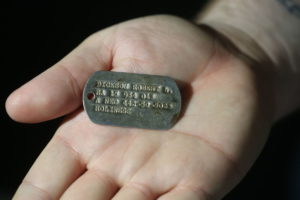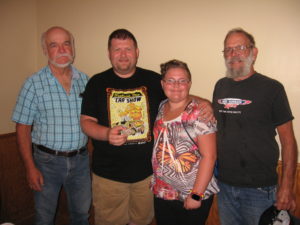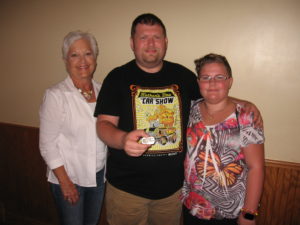Rob Dickson – Recovered dog tag links adult son to his veteran dad’s past
Recovered dog tag links adult son to his veteran dad’s past
By Kathy Hanks The Hutchinson News
 The tarnished dog tag was a relic from a war that ended 43 years ago, but Robert Dickson Jr. is keeping it in a black velvet pouch like a fine jewel.
The tarnished dog tag was a relic from a war that ended 43 years ago, but Robert Dickson Jr. is keeping it in a black velvet pouch like a fine jewel.
For Rob Dickson, Hutchinson, it’s something tangible he can hold on to, helping to connect him with his father, Robert Dickson Sr., a man he hardly knew.
The phone call came out of the blue and was a bit bewildering. The person on the phone wanted him to know that his father’s dog tag had been found in Vietnam. It brought back memories for Rob of Army Staff Sgt. Robert “Big Lee” Dickson, who passed away in 1999.
The solitary dog tag was lost sometime while he served two tours in Vietnam, during 11 years in the Army. Rob Dickson’s parents were divorced when he was 2. He was raised by his mother.
“He had post-traumatic stress disorder from Vietnam, which caused us to be estranged,” Rob Dickson said. “I grew up without a father. He reached out occasionally to Mom. He didn’t want his family around a drunk dad.”
 Rob spoke with his dad on the phone before leaving for the Marine Corps in 1999. He sensed his father was satisfied his son had enlisted. They never spoke again because his father died that same year. Thanks to the Dog Tag Project, which has a mission of returning dog tags found in Vietnam, he was recently reunited with his father’s past.
Rob spoke with his dad on the phone before leaving for the Marine Corps in 1999. He sensed his father was satisfied his son had enlisted. They never spoke again because his father died that same year. Thanks to the Dog Tag Project, which has a mission of returning dog tags found in Vietnam, he was recently reunited with his father’s past.
The collection of dog tags was brought back from Vietnam by a former USMC veteran and retired police chief in 1993. According to Sue Quinn-Morris, who works with www.patriotconnections.org heading up the Dog Tag Project, the man was offering logistics support in Da Nang for Operation Smile. There were a lot of villagers with dog tags they had collected when gathering metal for resale. He found a villager who had more than 400 dog tags. He purchased them and brought them back home.
He wasn’t sure how to go about returning them, and in 2010 Quinn-Morris received the bag because she worked with the POW /MIA committee in New Jersey, and was asked if she could try to return them. Meanwhile, the POW/MIA committee disbanded and switched hands to the Patriot Connection.
“I have been returning them,” Quinn-Morris said. “It’s something I do on the side.”
 It’s a time-consuming process involving lengthy research, depending on the dog tag. With Robert Dickson, she said the dog tag had his service number and Social Security number. Through research on the Internet she saw he passed away, then found his half-sister, who gave her Rob Dickson’s name.
It’s a time-consuming process involving lengthy research, depending on the dog tag. With Robert Dickson, she said the dog tag had his service number and Social Security number. Through research on the Internet she saw he passed away, then found his half-sister, who gave her Rob Dickson’s name.
“I am passionate about our veterans. It is just so rewarding to get them back to the veteran or the family,” Quinn-Morris said. “If they are deceased, it has so much meaning for the relatives to receive it. I always look at it as it’s the veteran’s way of saying, ‘Hey, I am OK. I am thinking of you,’ and it helps the family.”
Since 2010 she has delivered about a hundred, and there are numerous dog-tag returns underway, with two current deliveries about to happen in Arizona and Florida.
Quinn-Morris discovered Jody Dukelow, in Wichita, in 2012, when attempting to return her late brother’s dog tag. They try to hand-deliver the dog tag, but some say just mail them, and that was what Dukelow wanted. But afterward she told Quinn-Morris if they ever had dog tags that needed to be delivered in the area she would be happy to return them.
 Dukelow placed the dog tag in Rob’s hand in August, during a dinner at the Carriage Crossing. Rob brought along his daughter Kailyn, 10. Dukelow brought two friends, Vietnam veterans Freddie Robbins of Lewisville, N.C., and Bill Hendren of Ozark, Ala., to be part of the presentation of his father’s dog tag.
Dukelow placed the dog tag in Rob’s hand in August, during a dinner at the Carriage Crossing. Rob brought along his daughter Kailyn, 10. Dukelow brought two friends, Vietnam veterans Freddie Robbins of Lewisville, N.C., and Bill Hendren of Ozark, Ala., to be part of the presentation of his father’s dog tag.
According to an article at www.historynet.com/found-lost-dog-tags-in-vietnam-genuine-or-fake.htm, “Despite what some say, our research has shown that the vast majority of the thousands of dog tags for sale on the streets and in the small shops throughout Vietnam are authentic – made in the United States or in Vietnam, stamped and worn by our service personnel who served in-country, many of whom were killed in action. The simple fact is, tens of thousands of dog tags were lost in the heat of battle or during medical treatment, and left behind.”

